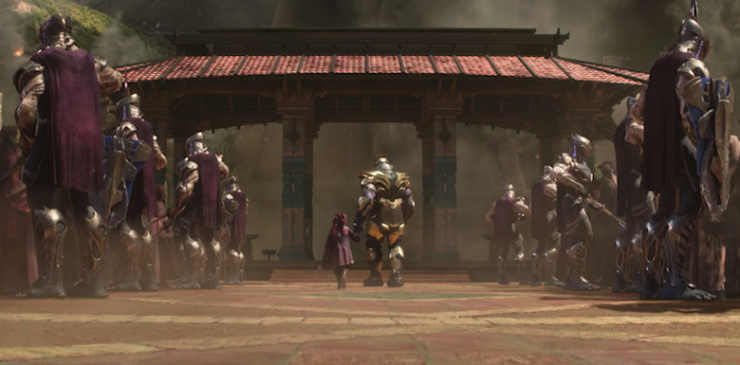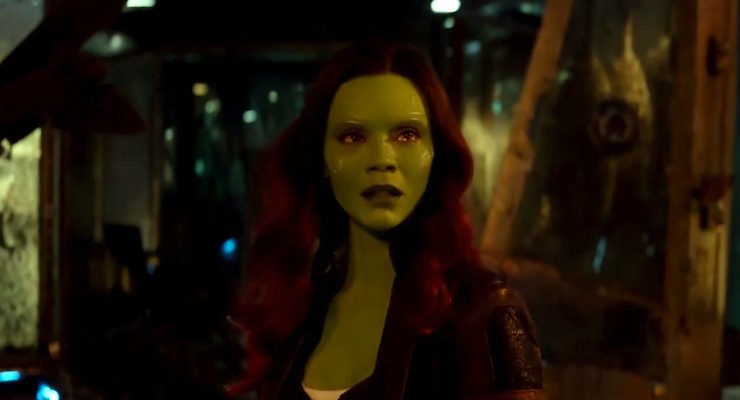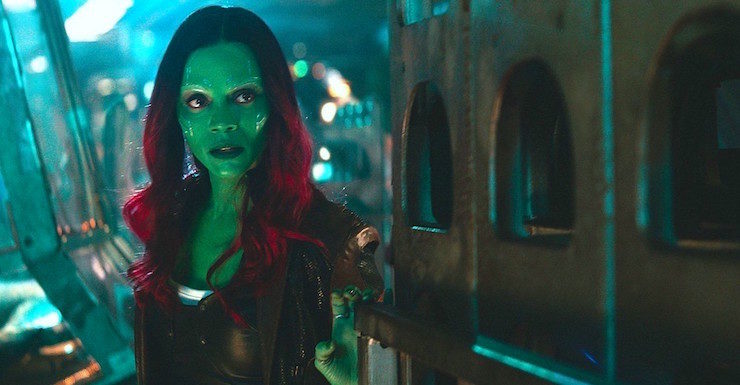I find myself, for the most part, in the minority of people who didn’t quite enjoy Avengers: Infinity War.
To be clear, this is not me saying that that the movie is bad, or unenjoyable in a general sense. The action was engaging for the most part, and there are some character progressions that I think elicited real dramatic effort from the film. I like how it sets up Tony Stark’s pained, traumatic franchise-long journey from selfish, egotistical brat to responsible, self-sacrificing, if conflicted leader, which I hope they go all in on in upcoming installments. Thor, being my absolute favourite character from the franchise in general, has one really committed throughline, from losing everything that ever mattered to him in two back-to-back genocides to literally taking a beam of white-hot suffering through his body just to regain trust in his own heroic potential. Individual moments, like when Captain America, Black Widow, and Falcon have their first fight with Thanos’ Black Order goons in Scotland, are delightful to look at, visually. And some of the more unlikely on-screen team-ups, like Tony with Doctor Strange, or Thor with Rocket, actually make room for really interesting dialogue.
But ultimately, there’s one aspect of the film that I simply can’t get past. We need to talk about what happens to Gamora.
Sure, there are plenty of other issues and complaints that can and have been addressed elsewhere, but I’m not going to talk about how this shift away from Thanos’ comic-book intentions made his villainy seem weaker to me. I’m not going to talk about how frustrating it is that a villain’s intentions are to save the universe from resource depletion by reassembling the forces that created that very universe and insisting upon destruction, while no one even tries to suggest that he could just as simply create more resources with the same infinite power, and how refusing to do so makes the entire story feel hollow and mindlessly plot-driven instead of legitimately challenging. I’m not going to talk about how many of the character deaths are meaningless and adds no emotional value or weight to the movie—like how T’Challa says all of six lines of dialogue, more than half of which are comical, in the movie where his entire nation sacrifices their lives for the sake of the world; or how Vision spends most of the film reduced to a sentient MacGuffin.
Instead, I’m going to just talk about Gamora.
Just Gamora. Because all the rest of these problems pale in comparison to her treatment in this film.
Going all the way back to the first Guardians of the Galaxy film, the promise has been built into the narrative: clearly, Gamora’s toxic, abusive ‘family’ relationship with Thanos would be one of the dramatic concerns of the franchise. We knew on some level that the two would have to confront each other, and that it makes sense that this moment would occur in the lead-up to the fulfilment of Thanos’ grand scheme.
I was particularly looking forward to that confrontation going into this film, but I was also looking forward to getting further insight into Gamora’s past, and further context for their relationship. Remember, everything we know about Gamora and Nebula’s relationship with Thanos has been delivered entirely through dialogue up to this point, and most of it has been centred around their communion as sisters more than its been about Thanos at all. Which makes sense up to this point, but I was hoping that Infinity War would properly establish for the audience that these two women have suffered unspeakable trauma as children as a result of their very proximity to him.
Instead, the movie gives us but one momentary glimpse into that past trauma: the day that Thanos murdered half the people of Gamora’s homeworld. I want to make clear that I’m not saying that this scene doesn’t add any additional context to Gamora’s pain. However, between that moment and the events of Infinity War lie decades of torture, mental and emotional manipulation, and servitude to Thanos. Expanding on the true extent of her trauma would have been much more useful than this single scene.

But then again, considering how their confrontation ultimately ends, it seems Gamora’s experience and suffering was far from the film’s primary concern. Or even, arguably, a concern at all.
Which… troubles me. (I could use so many other words than “troubles,” but I’ll be generous for now.)
Let’s trace out Gamora’s entire plot strand, as briefly as possible: after rescuing Thor from his destroyed ship, the Guardians split into two groups: Groot and Rocket go to help the God of Thunder forge a new weapon, and the others head to Knowhere in hopes of retrieving the Reality Stone before Thanos arrives. Before they get there, Gamora gravely and urgently asks Peter Quill for his promise, if things go wrong, to make a demanding sacrifice—to kill her if Thanos captures her, because only she knows where the Soul Stone is, and would rather lose her life than share that knowledge. Surprising no one, Thanos does capture her, after using the Reality Stone to convince her that she had finally succeeded in killing her tormentor once and for all. Thanos disappears with his adoptive daughter (read: orphan hostage) and the stone in one fell swoop.
After displaying the barest modicum of compassion for her by offering a bowl of food, he asks Gamora to finally share the location of the Soul Stone, and she insists she knows nothing about it. Thanos’ ace in the hole waits behind a door on his ship: Nebula, her sister-in-trauma, being tortured—slowly and painfully disassembled—as a final attempt to compel Gamora to confess the location of the stone. She does, and the two venture to the planet Vormir to retrieve it.
Apparently, Vormir has rules. A spectral Red Skull appears at the summit of a mountain to relay the terms to Thanos and his captive: the world will only bestow the Soul Stone to someone who sacrifices the person they love most. Gamora, in hesitant but unreserved schadenfreude, finally faces her abuser in triumph. “You love nothing,” she hisses. After his entire crusade, the fact of his own essential, all-consuming malevolence has finally laid him low. Or so we think, momentarily.
When Thanos turns, he is crying. Gamora scoffs. A hulking, powerful Titan, driven to tears because he doesn’t get what he wants?
Red Skull corrects her. Apparently, somehow, that’s not why he’s crying.
Thanos is crying over the terrible sacrifice he’s about to make.
This singular moment, of all the elements and choices in this film that disappointed me, is the one that truly incensed me. (Again, “incensed” is another overly-generous word choice, here, in terms of describing my feelings.) Thanos doesn’t even hesitate to throw the woman he claims to love as his own child off the edge of a cliff in order to gain power. He doesn’t pause. He gives no consideration to Gamora’s feelings, and uses the taste of infinite power he already wields to prevent her from fighting back. It happens in an instant, as a single, salty tear runs down his pastel purple cheek, accompanied by the painful, buffered wailing of his victim as she falls to her doom.
Follow my train of thought for a moment:
We’re supposed to believe that a man can tear apart, physically and emotionally abuse, psychologically torture, and utterly break someone’s spirit over the course of their entire childhood, and accept that the name for what he feels for is victim is “love”? When Thanos is called upon to make this sacrifice, and is somehow able to do so without ever taking stock of his own cruelty or facing the horror that he has put Gamora through, I submit that what he feels for her should never be described as anything approximating love.
That’s obsession. That’s manipulation, and oppression. That’s egomania.
That’s abuse.

And you mean to tell me that, in this universe—that is, both the cosmos of this story and the Marvel Cinematic Universe as constructed by writers Christopher Markus and Stephen McFeely—we’re supposed to accept that this somehow counts as “love”? That just because Gamora is, in some intensely twisted fashion, the person Thanos somehow meant to hurt the least, their relationship (at least on his end) qualifies as genuine compassion or devotion?
Because I’m not frickin’ buying it.
When you make the case through your work that all that matters for a relationship to be considered one of sincere love is that an abuser believes that he or she is in the right, you teach viewers that all kinds of terrible behaviour is acceptable, irreparably and irresponsibly blurring the lines between victimization and affection. The fact that so many of the people seem to consider Thanos’ behaviour in the film “reluctant” or “pained” already says a lot to me in terms of how easily the media, and society at large, writes off the actions and consequences of abuse.
I have no doubt in my mind that Thanos thinks he is motivated by some aggressively misplaced sense of fatherly affection. I’m sure that’s what he thought about murdering half the people on Gamora’s home planet, too. But when you take away the Infinity Gauntlet and the extra body mass and the stone throne and the silly cosmic crusade, what you have left is a man saying that he killed a woman because he truly cared about her—and the universe rewarding him for doing so.
Infinity War, to me, is laden with moments where characters pick up the Idiot Ball just because the plot requires momentum. This plot thread is more than that. Every part of this reads like the worst parts of Idiot Plot combined with a core misunderstanding of the character stakes that previous movies established, and a lack of empathy or introspection in general.
I already expect that by the next Avengers film, or possibly even before, many of the more intense elements of Infinity War will be swiftly walked back. The dead will rise from their graves, the hard work will all have somehow paid off, the good guys will have their chance to watch the sun set on a grateful universe.
But no matter what, this happened to Gamora. A lifetime of torment and victimhood, all leading up to the horror of her final moments—her horrified realization that her tormentor is able to use her broken body as the gateway to his ultimate desire because what he feels for her is truly love.
The film accepts this, never questions it, even creates its own tortured reasoning for it, and asks you to trust that reasoning.
I don’t. And I think it’s beyond troubling or offensive to ask us to do so—it’s dangerous.
Brandon O’Brien is a performance poet and writer from Trinidad. His work is published or upcoming in Uncanny Magazine, Strange Horizons, Sunvault: Stories of Solarpunk and Eco-Speculation, Arsenika, and New Worlds, Old Ways: Speculative Tales from the Caribbean, among others. He is also the poetry editor of FIYAH Magazine. You can find his blog at therisingtithes.tumblr.com or on Twitter @therisingtithes.










